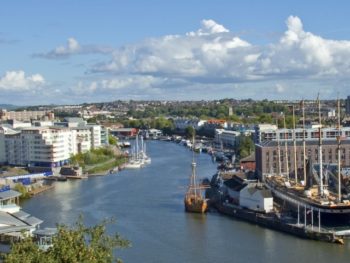Plans to ban diesels in Bristol city centre have advanced to the next stage after securing approval from the council cabinet.

The plans, revealed last week, would see the introduction of a small area diesel ban for all privately owned vehicles, potentially including vans, alongside a charging zone for non-compliant commercial vehicles such as buses, taxis, HGVs and LGVs. A car scrappage scheme would also be launched and further measures for tackling air quality through improving and prioritising public transport options have also been suggested.
The plans, which would take effect from March 2021, have now been approved by the cabinet but still require government approval.
ClientEarth has already said the plans are a step in the right direction – but don’t go far enough.
And green energy supplier Tonik Energy has welcomed the new. Thomas Newby, chief operating officer, said: “Bristol is setting a nationwide standard of change and it’s one that cannot come soon enough for its most at-risk residents. The city is a pioneer on the UK’s mission to bring air pollution levels down, bravely going one-step further than London’s clean air zone policy. This has set a precedent for cities across the UK and collaborative action is now needed to ensure this plan does not fall victim to policy paralysis.
“The UK’s net zero emissions target may be sizeable, but it’s not impossible. Any pledge to reduce greenhouse gas emissions is a step in the right direction; but true change – particularly one that is set out to tackle toxic transport systems – requires imagination and action beyond what we have already seen. As electric vehicles become the new normal – as we expect to see in Bristol – there will be increasing pressure on private and public sector stakeholders to ensure the infrastructure is in place to support the boom in clean, green motoring. An assumption that existing electrical connections, for example, are suitable for significant increases in power demand from electric vehicles, is likely short sighted.”
However, research by ALD Automotive, in conjunction with the University of the West of England (UWE), has found Bristol’s Clean Air Zone proposals could hit fleets hard, forcing them to adopt cleaner vehicles.
The study found that the potential cost to a typical fleet of 30 cars could be over £30,000. The study also looked at 10 months’ worth of data, from vehicles fitted with ALD telematics, to understand the movement of vehicles in Bristol and the surrounding area. It found that, depending on the position of the Bristol CAZ boundary, almost half (49%) of all vehicles entering the zone were non-compliant and would therefore potentially attract a charge. For vans (LCVs) the figure was over 80%.
“The findings of our study have huge implications for everyone,” said Matt Dale, head of consultancy for ALD, “not only for the financial impact but the administrative burden too. Employers wishing to minimise the impact will also need to consider the HR implications of forcing drivers to change their vehicles.”
It is not just business trips that will be affected. Commuters could also be hit, particularly as just 6% of all the UK’s cars are compliant under the CAZ plans. For some commuters, the impact could be double, as Dale explained: “With neighbouring cities around the country considering introducing CAZs, commuters living in one zone, for example Bath, and commuting into another such as Bristol, will attract two daily charges.”
Meanwhile the SMMT has said that a blanket ban will cause confusion.
Nigel Base, commercial vehicle manager, said: “We want to see all cities, including Bristol, meet their targets and continue to invest in ever more advanced technology to help improve our environment. However, this proposed blanket ban, which goes against government’s guidelines, fails to distinguish between modern vehicles and decades-old technologies and will only cause confusion for drivers while also undermining efforts to boost air quality.
“The automotive industry is committed to a low carbon future, and is investing massively to get there. Average CO2 emissions from new cars have declined by around a third since 2000, and the development of the latest low emission technology has resulted in new vehicles that have vastly reduced NOx and virtually eliminated particulates.
“Instead of the proposed ban, we need a clear and consistent national approach to clean air zones that incentivises uptake of the latest, low emission vehicles, including new Euro 6 diesels, which are the cleanest ever produced, alongside improvements to traffic flow and investment in charging infrastructure.”
The FTA has also expressed its concerns over the move and called for clarification on whether other vehicles besides cars will be included. Chris Yarsley, FTA’s policy manager for the South West of England, said: “A ban on all diesel vehicles would have a massive impact on local businesses; they must be given clear direction and adequate time to prepare. While FTA and its members fully support the council’s aim to improve air quality, we expect clarity on matters of such importance as a bare minimum. The confusion leaves local businesses in the dark on how to proceed with business planning.”

